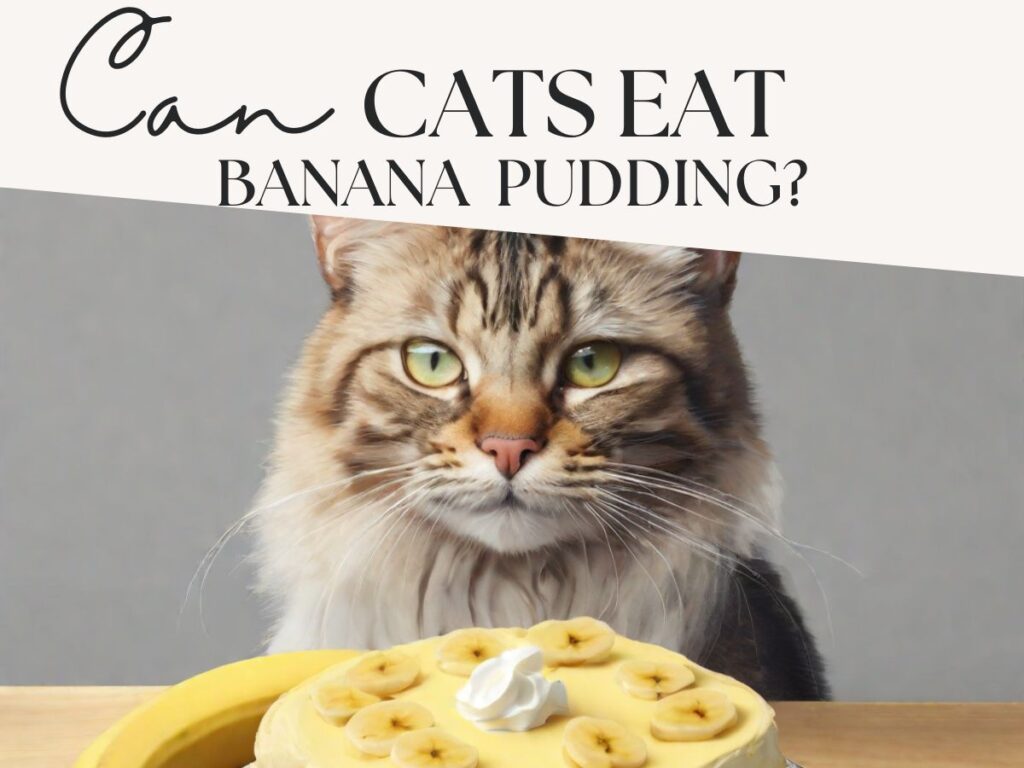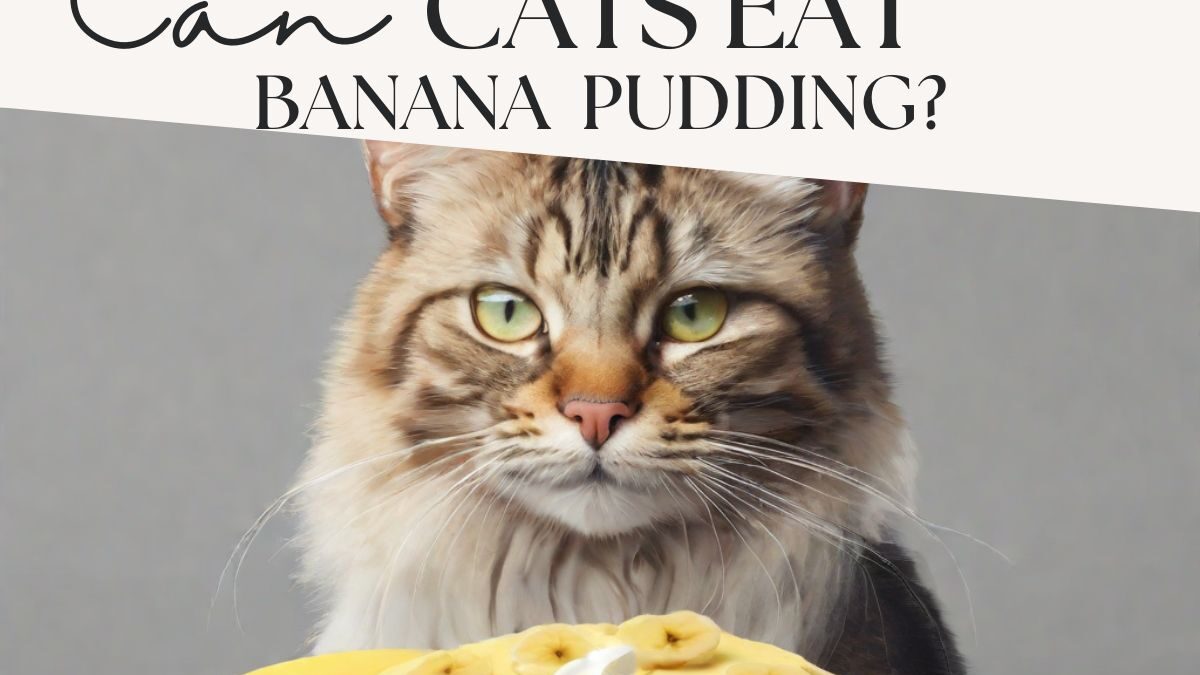Can Cats Safely Consume Banana Pudding?
Banana pudding is not considered a safe food for cats. While bananas themselves are not toxic to cats and can be given in small quantities as an occasional treat, the other ingredients typically found in banana pudding can be harmful to them.
Bananas are generally safe for cats to eat in moderation. They are a good source of potassium and can provide some nutritional benefits. However, when it comes to banana pudding, it usually contains ingredients that are not suitable for cats. Most banana pudding recipes include high amounts of sugar, dairy products like milk and cream, and sometimes even eggs.
Sugar is not recommended for cats as it can lead to obesity and dental problems. Dairy products can cause digestive issues in cats, as many cats are lactose intolerant and cannot properly digest lactose, the sugar found in milk. Eggs are not a part of a typical cat’s diet and may lead to an upset stomach or allergic reactions in some cats.
Additionally, certain artificial sweeteners like xylitol, which can be found in some commercial banana pudding products, are toxic to cats and should be strictly avoided.
To ensure your cat’s health and safety, it is best to stick to a balanced and appropriate cat diet that consists of specially formulated cat food. If you want to give your cat a treat, it is recommended to choose cat-friendly treats or consult with a veterinarian to determine safe options. It’s important to prioritize your cat’s nutrition, health, and safety when considering what foods to offer them.

As cat owners, we constantly strive to provide our feline friends with the best care and nutrition possible. However, when it comes to sharing our favorite human foods with them, it’s essential to exercise caution and consider their specific dietary needs. In this blog post, we will delve into the topic of cats and banana pudding, exploring its composition, the potential benefits of bananas for cats, the risks associated with feeding them banana pudding, and whether it is a suitable treat for our furry companions.
Table of Contents
What is Banana Pudding?
Before we delve into the topic of cats and banana pudding, let’s first understand what this delectable dessert entails. Banana pudding is a popular sweet treat that typically consists of layers of sliced bananas, vanilla custard or pudding, and a topping of whipped cream or meringue. It’s a delightful dessert enjoyed by many, but is it safe and suitable for our feline friends?
Nutritional Benefits of Bananas for Cats
Bananas, known for their delightful taste and numerous health benefits, can offer some nutritional value to our feline friends as well. Here are a few benefits of bananas for cats:
- Fiber: Bananas are a good source of fiber, which is essential for maintaining a healthy digestive system in cats. Adequate fiber intake can help prevent constipation and promote regular bowel movements.
- Potassium: This fruit is rich in potassium, a mineral that plays a vital role in regulating blood pressure and heart rate in cats. Including bananas in your cat’s diet can contribute to their overall cardiovascular health.
- Vitamin C: Bananas contain vitamin C, which can help boost your cat’s immune system. A strong immune system is crucial for warding off illnesses and keeping your cat healthy.
Potential Risks of Feeding Banana Pudding to Cats
While bananas themselves can offer some nutritional benefits, banana pudding may not be the best choice for your feline companion. Here are a few reasons why:
- Dairy Products: Banana pudding often contains dairy products like milk or cream, which can be difficult for some cats to digest. Many cats are lactose intolerant, meaning they lack the necessary enzymes to break down lactose, leading to digestive issues such as diarrhea or upset stomach.
- Unhealthy Ingredients: Commercially prepared banana pudding may contain added sugar, artificial sweeteners, or preservatives, which are not suitable for feline consumption. These ingredients can contribute to weight gain, diabetes, or other health complications in cats.
- Portion Control: Feeding your cat excessive amounts of banana pudding can lead to weight gain and obesity, which can have serious implications for their overall health and well-being.
Should You Feed Your Cat Banana Pudding?
In general, it’s best to avoid feeding your cat banana pudding due to the potential risks associated with its ingredients. However, if you still want to offer your cat a small taste of this treat, there are a few precautions to keep in mind:
- Choose Fresh, Whole Ingredients: Opt for homemade banana pudding made with fresh bananas and without any added sugar or dairy products. This way, you can ensure that your cat is consuming a healthier version of the treat.
- Monitor Your Cat Closely: After feeding your cat a small amount of banana pudding, observe them closely for any adverse effects. Look out for signs of digestive upset, such as vomiting, diarrhea, or abdominal pain. If you notice any negative reactions, discontinue feeding them banana pudding and seek veterinary advice.
Conclusion
While bananas can provide some nutritional benefits to cats, banana pudding is not the best choice for our feline companions. The dairy products, unhealthy ingredients, and potential risks associated with feeding them this treat outweigh the benefits. It’s crucial to prioritize your cat’s health and well-being by opting for a balanced and appropriate diet formulated specifically for feline nutrition.
Additional Tips for Feeding Your Cat Safely
In addition to the information provided above, here are some general tips to ensure the safety of your cat’s diet:
- Consult with Your Veterinarian: Before introducing any new food into your cat’s diet, including banana pudding, consult with your veterinarian. They can offer personalized advice based on your cat’s specific needs and health conditions.
- Start with Small Amounts: When introducing new foods, start with small portions to observe how your cat reacts. This approach allows you to monitor any adverse effects and make suitable adjustments accordingly.
- Monitor Your Cat’s Response: After feeding your cat banana pudding or any other unfamiliar food, closely monitor their behavior and overall well-being. If any negative symptoms arise, such as vomiting, diarrhea, or abdominal discomfort, stop feeding them the food and seek veterinary assistance promptly.
By prioritizing your cat’s nutritional needs and safety, you can ensure they lead a healthy and happy life free from potential food-related complications.
Disclaimer: This blog post is intended for informational purposes only and should not replace professional veterinary advice. Always consult with a qualified veterinarian regarding your cat’s diet and specific nutritional requirements.
Checkout as well: All about cats.
FAQ
Are there any safe alternatives to banana pudding for cats?
Safe alternatives to banana pudding for cats include specific treats designed for felines, such as catnip, cat-grass, or specialized cat-friendly desserts that exclude harmful ingredients.
What specific health issues can arise from feeding cats banana pudding?
Feeding cats banana pudding can lead to various health issues, including but not limited to digestive problems, lactose intolerance symptoms, and potential toxicity from certain ingredients.
How can pet parents ensure a balanced diet for their cats while avoiding potentially harmful foods like banana pudding?
Pet parents can maintain a balanced diet for their cats by sticking to feline-specific foods and consulting with veterinarians to curate an appropriate diet plan.
Is it advisable to feed cats any other type of pudding?
The risks associated with banana pudding extend to most other types of pudding due to shared ingredients. It’s generally recommended to avoid offering puddings to cats and instead focus on feline-specific treats.
Can Cats Have Vanilla Pudding?
Cats can consume small amounts of vanilla pudding, but precautions need to be taken. It is essential to avoid using vanilla extract due to its toxic ethyl alcohol content. Instead, using vanilla pods for flavoring is a safer choice. It is also advisable to limit the sugar content to prevent digestive issues. Cats may not tolerate alternative milk options like almond or soy milk well. It is recommended to offer a small serving, such as a teaspoon, of vanilla pudding to your cat..
Can Cats Eat Chocolate Pudding?
Feeding cats chocolate pudding or any chocolate-based food is never recommended. Chocolate is toxic to cats and can lead to symptoms such as muscle tremors, stomach problems, seizures, and even death. The darker the chocolate, the more dangerous it is for cats. Therefore, it is crucial to avoid giving cats any desserts containing chocolate, including chocolate pudding.
Can Cats Consume Rice Pudding?
Rice pudding is not a suitable dietary option for cats. Puddings, including rice pudding, usually have high sugar and dairy content, which can be harmful to a cat’s health. Additionally, rice is high in carbohydrates, which are unnecessary in a cat’s diet. It is best to refrain from feeding cats rice pudding.


Can I Use Witch Hazel on my Cat? A Helpful Guide - Pawsgal
[…] Can Cats Eat Banana Pudding? A Guide to Cat Nutrition and Pet Safety […]
Can Cats Eat Teriyaki Chicken or Not? - Pawsgal
[…] Can Cats Eat Banana Pudding? A Guide to Cat Nutrition and Pet Safety […]
Why Do Cats Love String So Much? - Pawsgal
[…] Can Cats Eat Banana Pudding? A Guide to Cat Nutrition and Pet Safety […]
Can Cats Eat Sesame Oil? A Comprehensive Guide Pawsgal
[…] Can Cats Eat Banana Pudding? A Guide to Cat Nutrition and Pet Safety […]